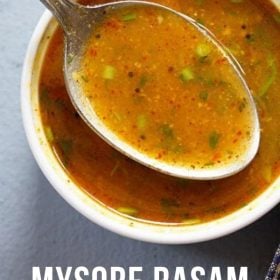Mysore Rasam recipe is spiced delicious rasam variant from the Karnataka cuisine. To make this unique and special rasam variety, you need to make mysore rasam powder – a special spice and lentils mix. In the post I show you to make this spice blend which you can easily scale and make a large batch to store and refrigerate. This recipe of mysore rasam is a favorite and I make it on occasions.
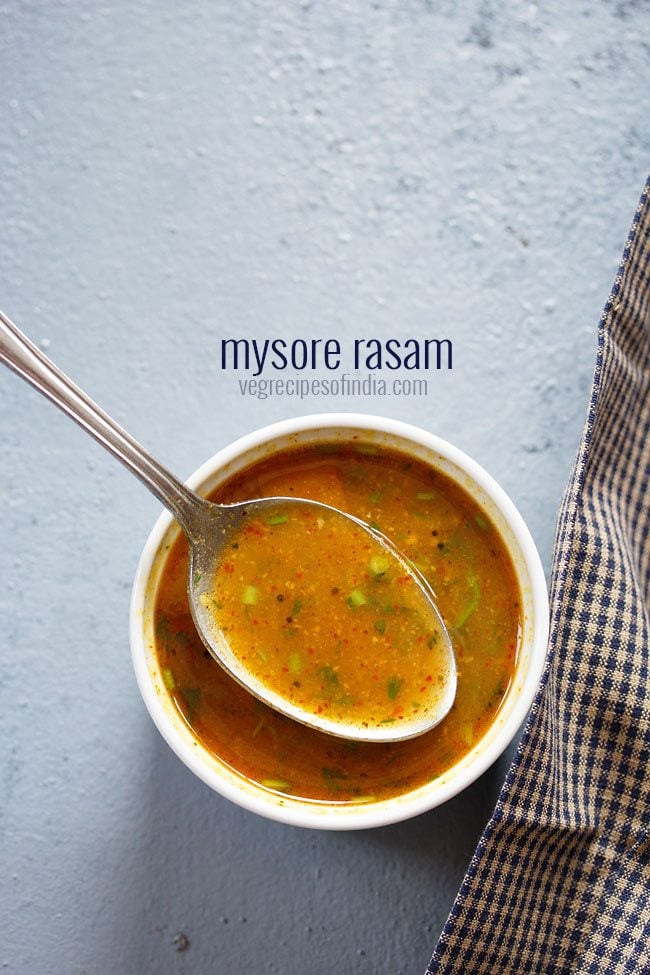
About Mysore Rasam
Rasam is a tangy or tart, thin, soup-like dish that is a part of South Indian meals. Rasam is made with lentils, fruits and vegetables. To get the tart taste in a rasam, tamarind is used. There are many rasam variants and this Mysore Rasam is one such variety.
Unlike the usual and regular South Indian rasam variants, Mysore Rasam is made with lentils and also has fresh coconut in it. Adding fresh coconut paired together with the flavors coming from ground spices, makes this rasam tastes too good. As a result this rasam pairs nicely with steamed rice.
Making mysore rasam takes time as the spices need to be roasted and then ground to prepare the mysore rasam powder.
When you prepare this rasam, simply make the rasam and make a side veggie dish like a veggie fry, poriyal or a veggie roast. Then cook rice and serve with rice.
Usually mysore rasam powder is available in South Indian markets. So if you have this rasam powder, you could use it as there will be less prep while making the dish.
Step-by-Step Guide
How to make Mysore Rasam
Cook Lentils
1. First rinse ⅓ cup arhar dal (tur or tuvar dal or pigeon pea lentils) for a couple of times. Then add the lentils in a pressure cooker. Also add a pinch of turmeric powder.
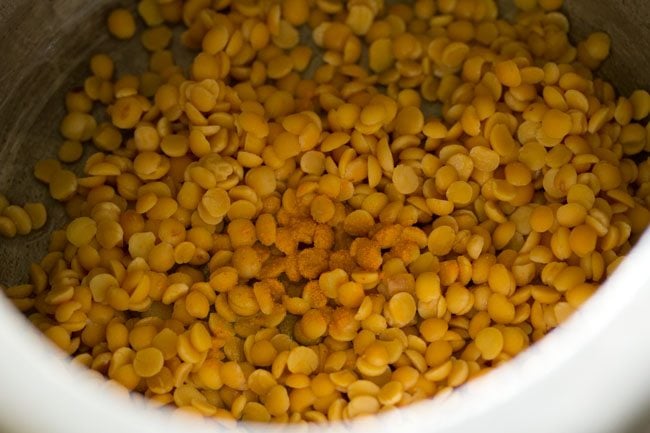
2. Pour 1.5 cups water.
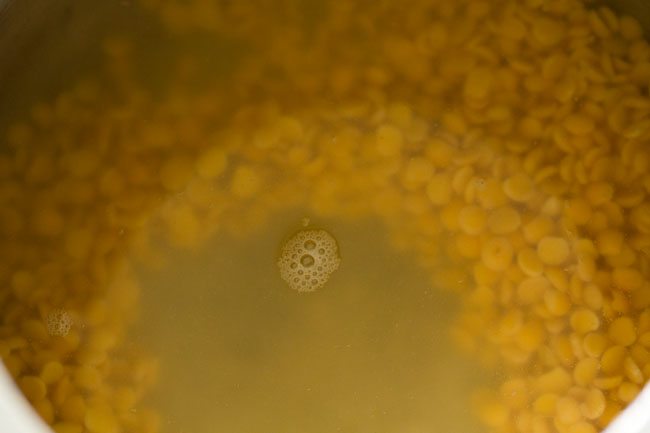
3. Pressure cook tuvar dal for 7 to 8 whistles or 11 to 12 minutes on a medium heat, till the lentils are completely cooked and softened.
When the pressure falls down on its own in the cooker, then only remove the lid. Check the doneness of the dal.
If in case they are not cooked well, then add ¼ to ⅓ cup more water and pressure cook for some more minutes.
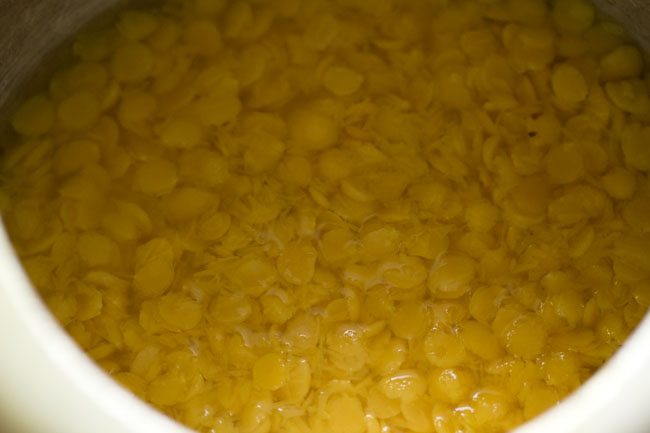
4. Mash the dal with a spoon or ladle. You can also cook the lentils in a pan.
Soak the lentils in water for 1 to 2 hours prior to cooking them in a pan or pot. Add water as required while cooking.
You could also cook the lentils in an Instant Pot adding water as needed.
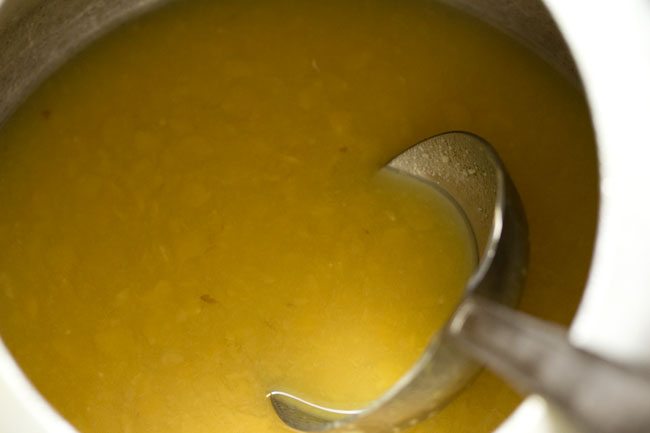
Make Tamarind Pulp
5. Take 1 tablespoon tightly packed tamarind.
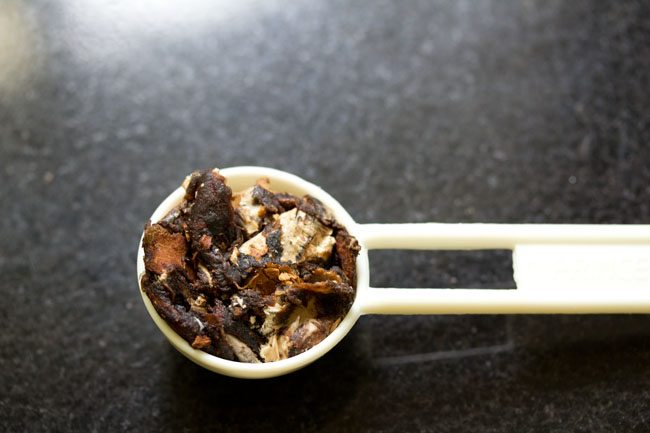
6. Soak tamarind in ⅓ cup hot water for 20 to 30 minutes.
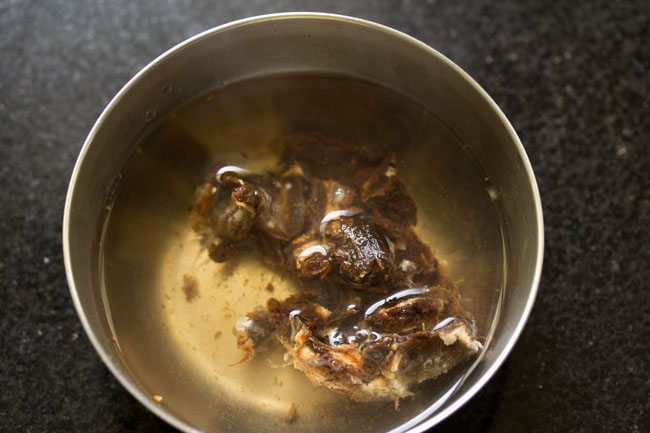
7. After 20 to 30 minutes, squeeze and extract the tamarind pulp in the water. Keep aside.
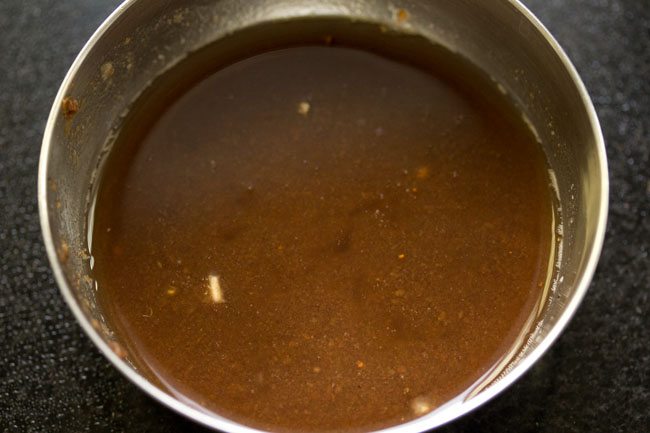
Make Mysore Rasam Powder
8. Now take all the spices for the mysore rasam powder as listed in the below photo.
For the red chilies, I have used byadagi chilies. These are low in heat and give a nice orangish-red color to any dish.
Though byadagi chilies are recommended for this recipe, if you do not have it, then you can use any low to medium hot dry red chilies.
If planning to make mysore rasam powder in more quantities for storage, then use desiccated coconut for a longer shelf life. Always refrigerate the mysore rasam powder.
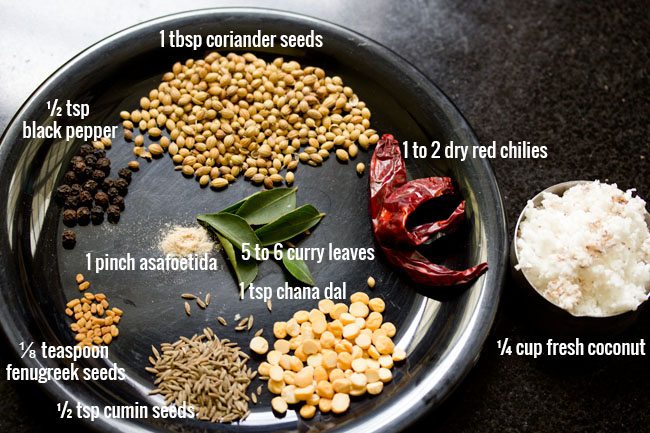
9. Heat 2 teaspoons ghee in a pan. Keep heat to a low.
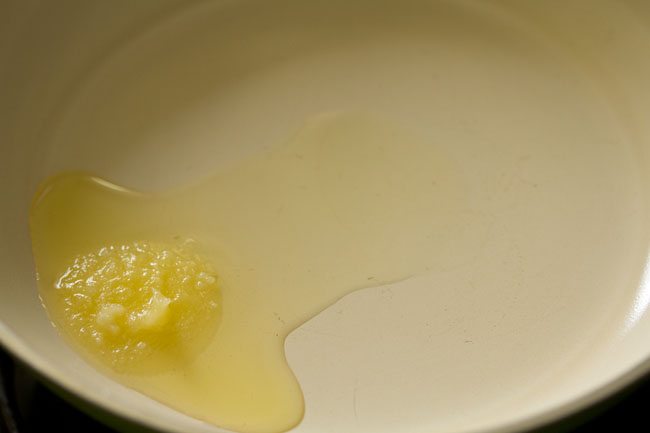
10. Add 1 teaspoon chana dal once the ghee melts.
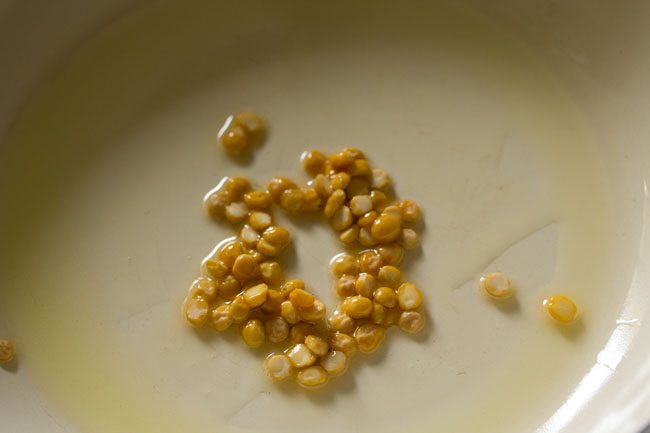
11. On a low heat fry chana dal stirring often till light golden.
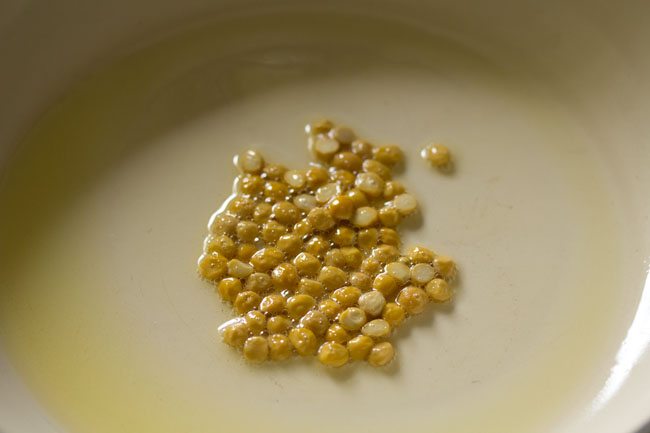
12. Next add 1 tablespoon coriander seeds, ½ teaspoon cumin seeds, ⅛ teaspoon fenugreek seeds (methi seeds) and ½ teaspoon whole black peppercorns.
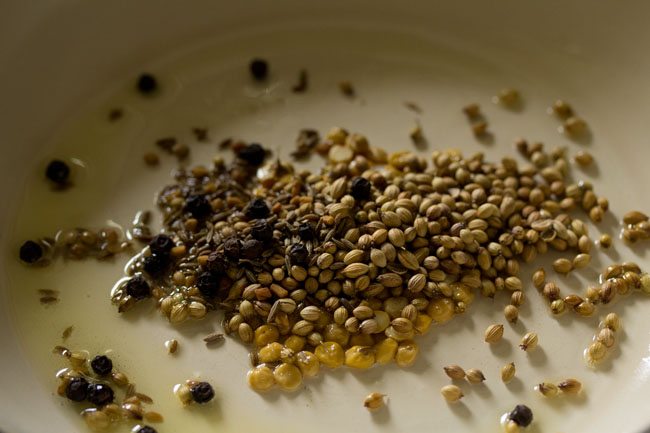
13. Then add 1 to 2 byadagi red chilies (seeds removed), 5 to 6 curry leaves and 1 pinch of asafoetida (hing).
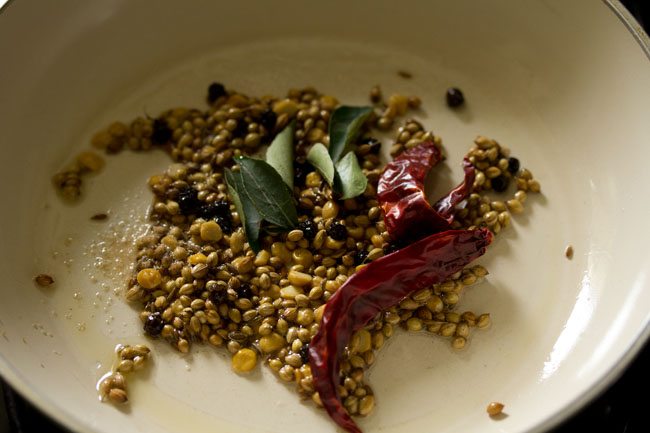
14. Mix well and roast for 2 to 3 minutes on a low heat stirring continuously till you get a nice fragrant aroma from the whole spices.
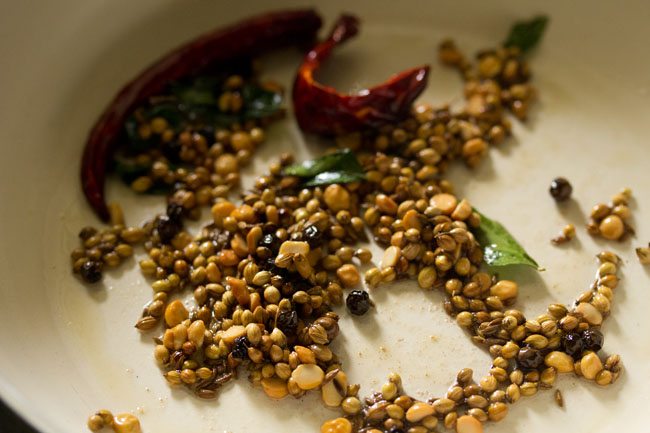
15. Then add ¼ cup grated fresh coconut. You can also use desiccated coconut instead of fresh coconut.
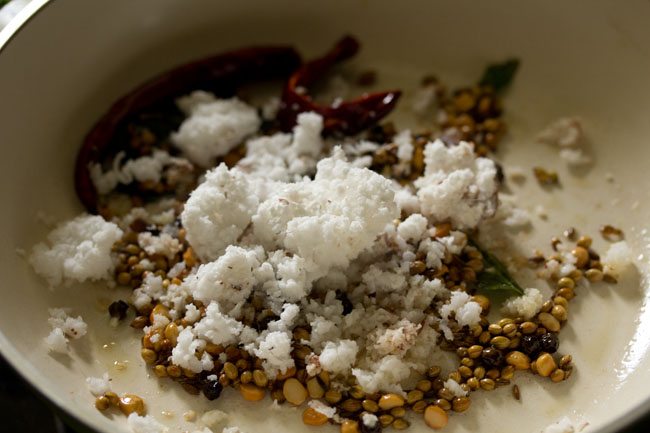
16. Mix very well with the remaining spices.
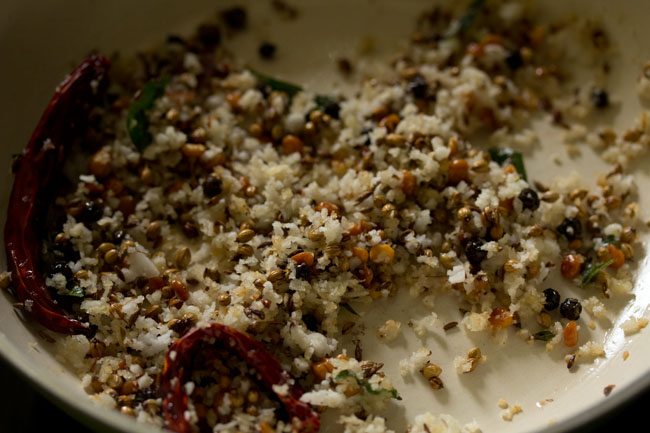
17. Roast for 1 to 2 minutes on a low heat. The fresh coconut just needs to get dry.
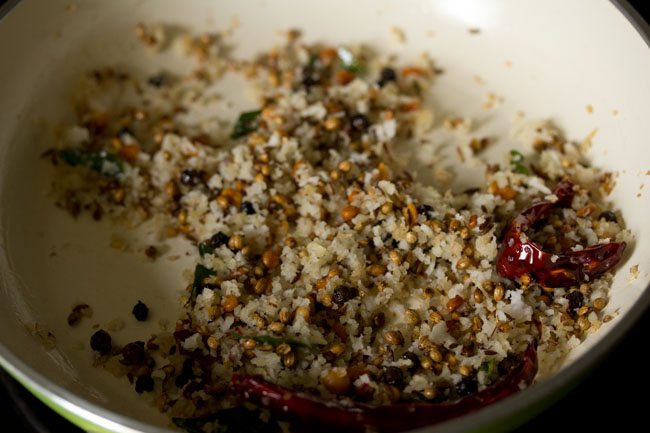
18. Then add all the whole spices and coconut in a grinder jar.
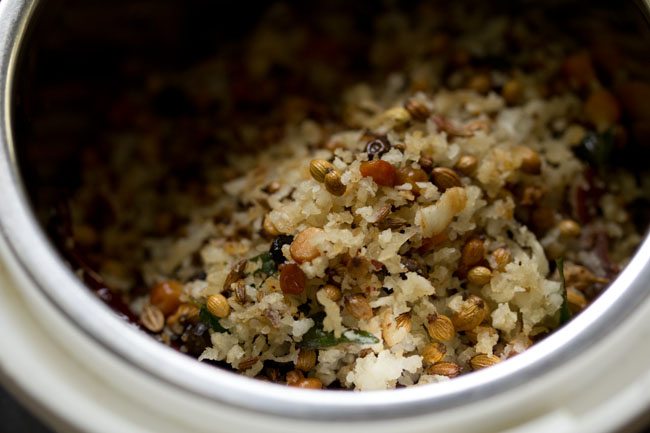
19. Without adding water, grind to a fine powder and set aside.
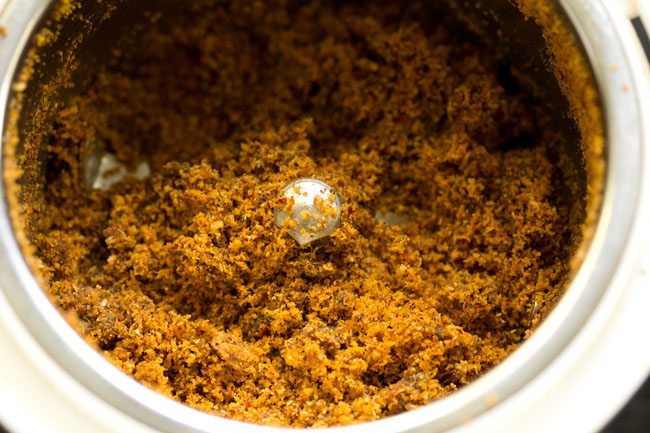
Make Mysore Rasam
20. Take a pan and strain the tamarind pulp in it using a tea strainer. You can also add tamarind pulp directly if there are less fibers in it.
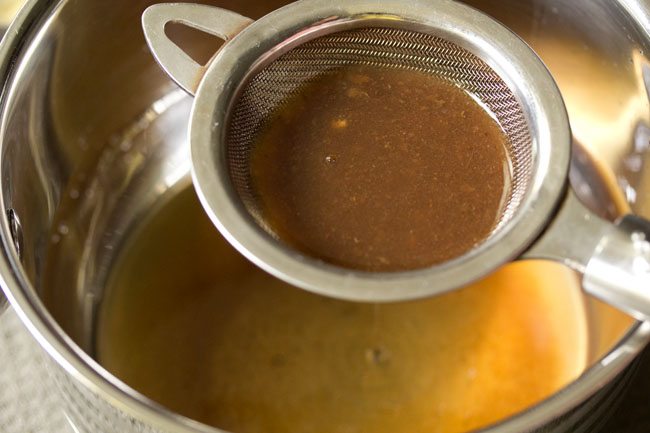
21. Add 2 cups of water and mix.
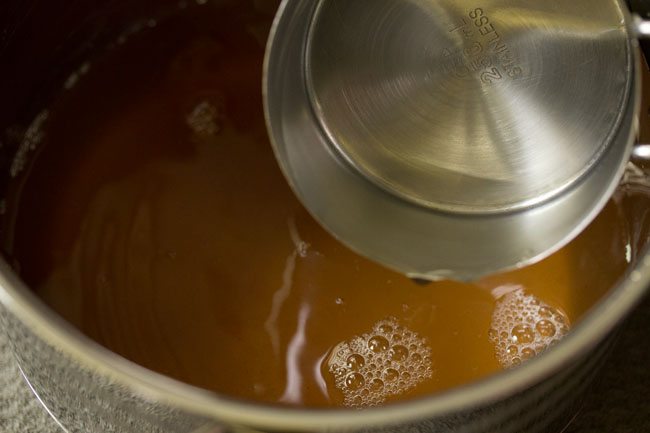
22. Keep the pan on stovetop and on a low to medium flame, heat the tamarind solution till its raw aroma and flavor goes away. Simmer for about 5 to 6 minutes.
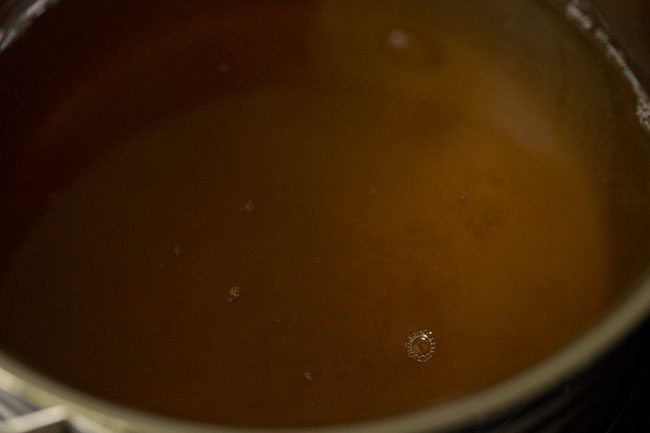
23. Then add chopped tomatoes.
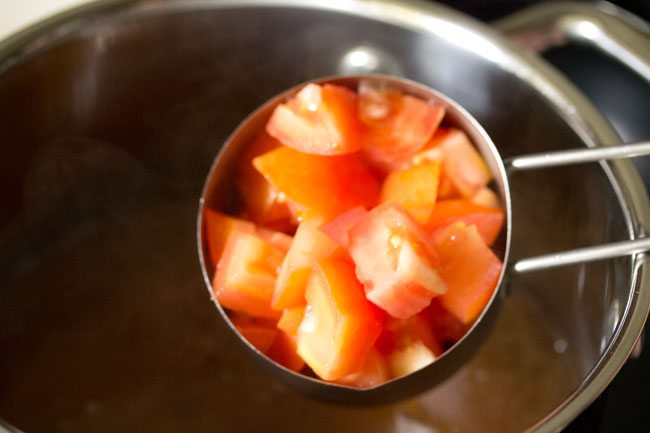
24. Next add ¼ teaspoon turmeric powder.
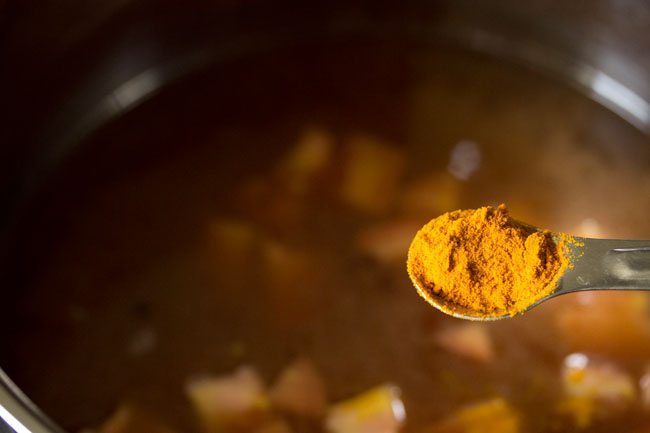
25. Cover the pan with a lid and cook till the tomatoes are softened. Cook for about 8 to 9 minutes on a low heat.
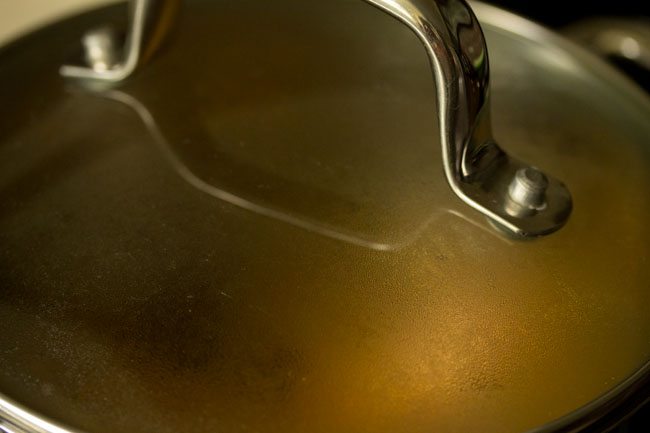
26. Cook till the tomatoes has softened.
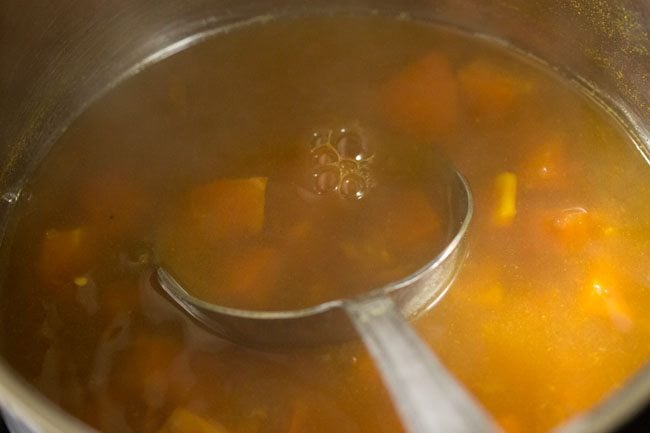
27. Then add all of the ground mysore rasam powder and the mashed tur dal. Mix thoroughly.
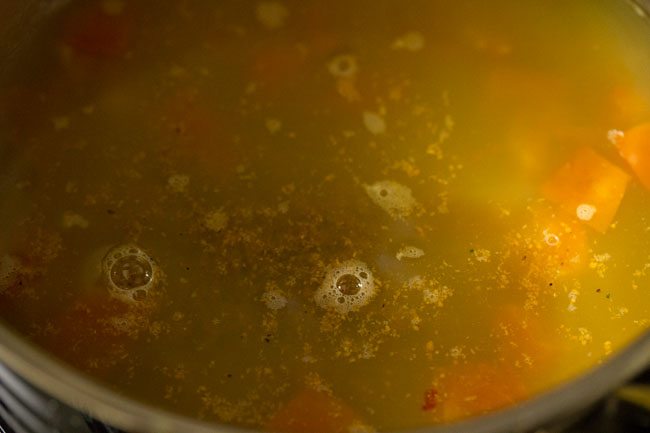
28. Season with salt as per taste. Stir to combine.
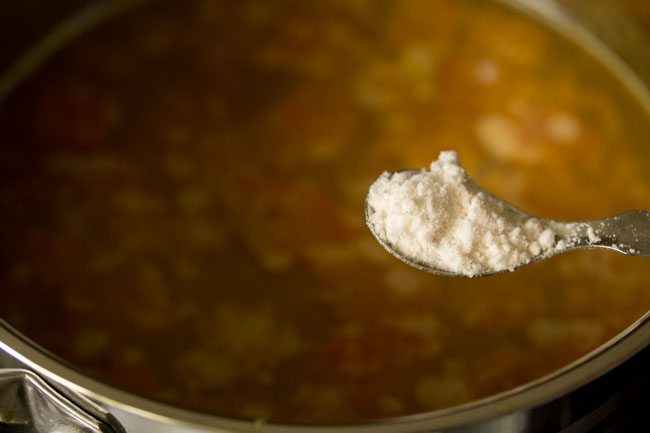
30. Simmer on a medium-low heat without a lid for 3 to 4 minutes. Cover the pan and keep aside.
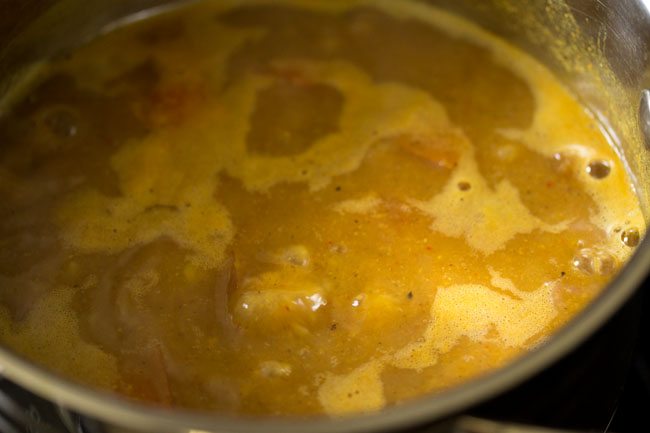
Make Tempering
31. Heat ½ tablespoon ghee in a small pan or tadka pan. You can even use oil.
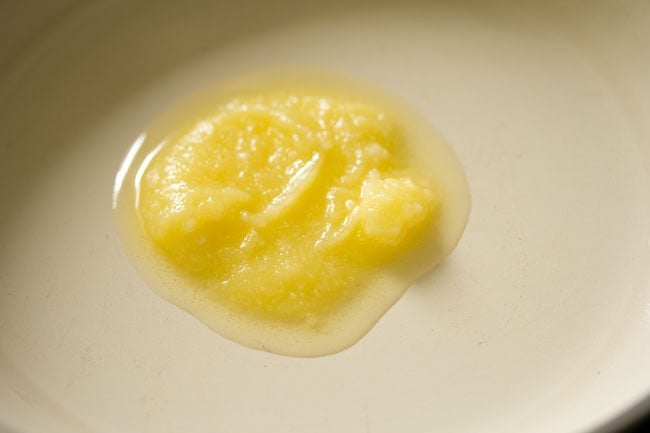
32. When the ghee melts and becomes hot, lower the heat and add ½ teaspoon mustard seeds. Let the mustard seeds crackle.
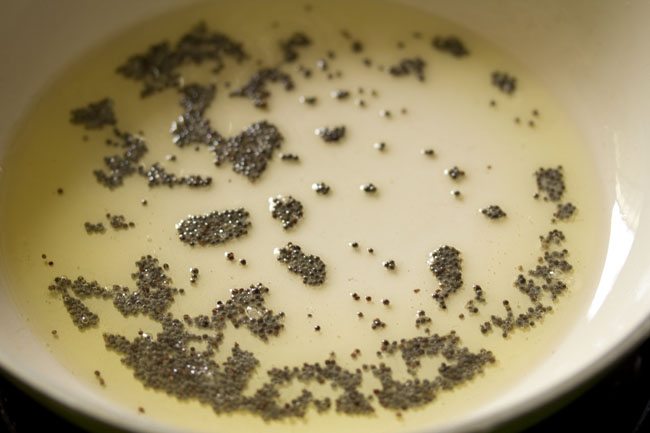
33. Once the mustard seeds begin to crackle, add 1 sprig curry leaves (10 to 12 curry leaves), 1 to 2 byadagi red chilies (seeds removed) and a pinch of asafoetida.
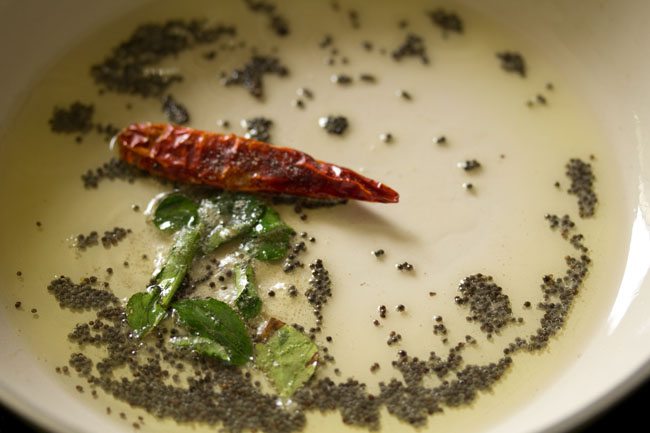
34. Stir to mix and fry till the red chili changes its color. Then switch off the heat. Avoid burning the red chilies or curry leaves.
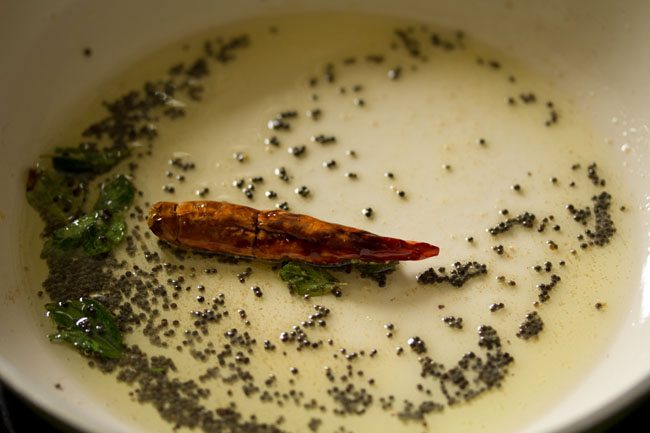
35. Pour all of the tempered ingredients in the rasam.
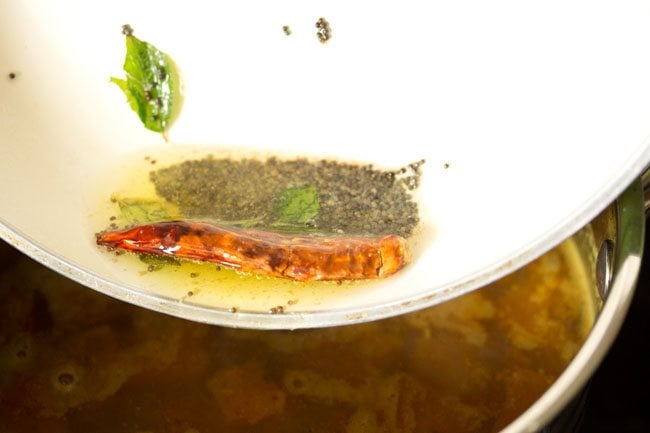
36. Cover with a lid and set aside for 5 to 6 minutes.
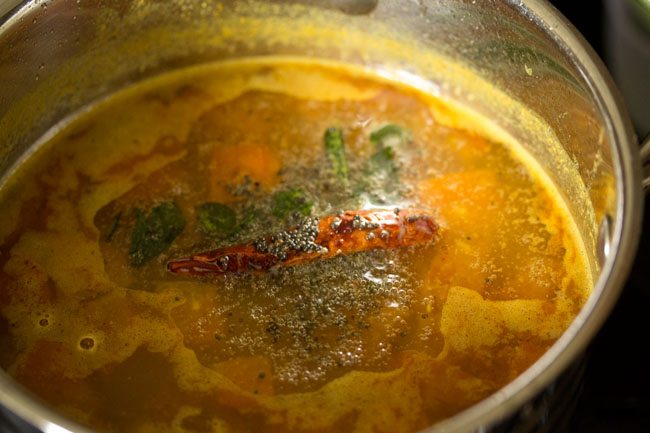
37. Lastly add 2 tablespoons chopped coriander leaves and mix.
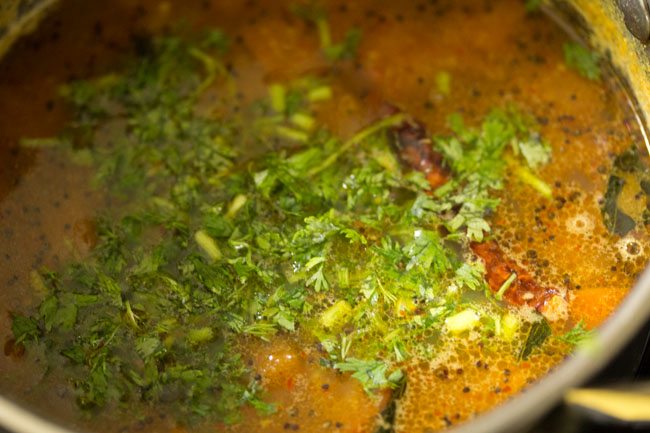
38. Serve Mysore Rasam hot with steamed rice and a side vegetable dish.
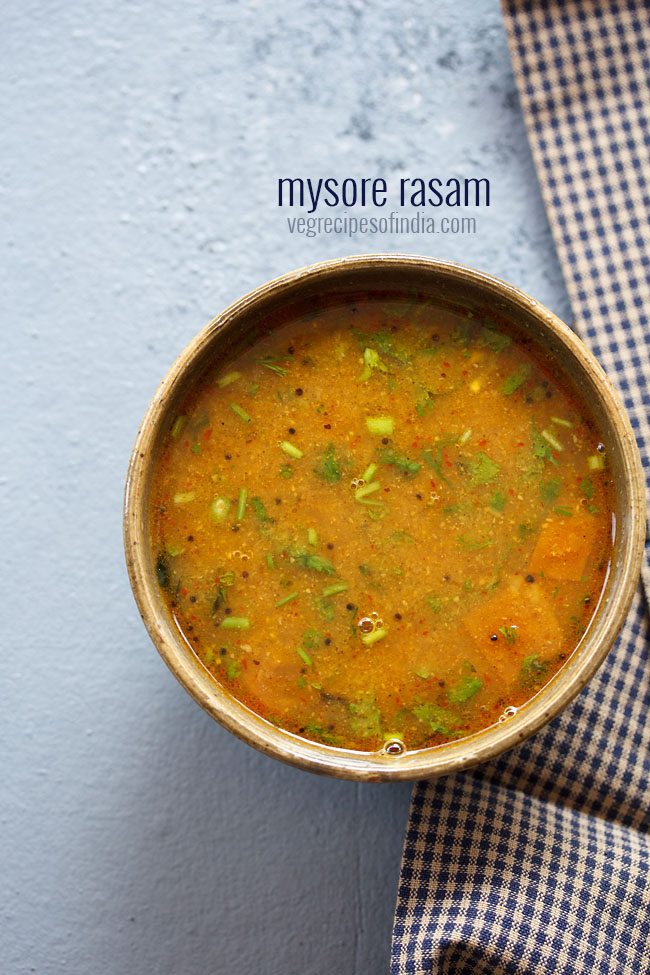
More Rasam varieties
Please be sure to rate this recipe in the recipe card below if you have made it. For more vegetarian inspirations, Sign Up for my emails or follow me on Instagram, Youtube, Facebook, Pinterest or Twitter.
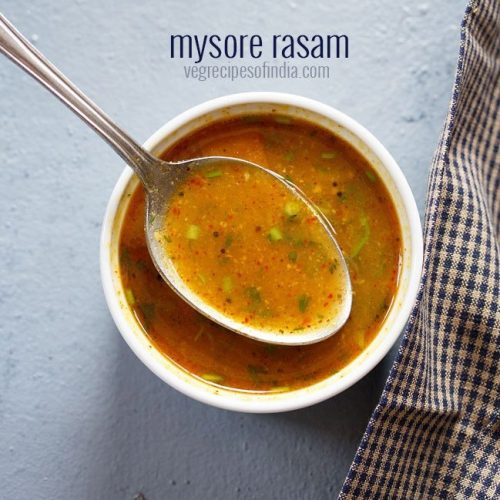
Mysore Rasam Recipe
Mysore Rasam is a spiced and delicious rasam variety from the Karnataka cuisine – made with lentils, ground spices and coconut. Here I share both the recipes for mysore rasam and the mysore rasam powder that you can easily scale up and make a large batch to store and refrigerate/freeze.
Prep Time 20 mins
Cook Time 20 mins
Total Time 40 mins
For pressure cooking lentils
Prevent your screen from going dark while making the recipe
Pressure cooking lentils
First rinse the arhar dal (tuvar dal or pigeon pea lentils) for a couple of times.
Then add the lentils in a 2 litre pressure cooker. Also add a pinch of turmeric powder and 1.5 cups water.
Pressure cook tuvar dal for 7 to 8 whistles or 11 to 12 minutes on medium heat, till the lentils are completely cooked and softened.
When the pressure falls down of its own, then only remove the lid. Check the doneness of the dal. Mash the dal with a spoon or ladle and set aside.
Making tamarind pulp
Soak 1 tablespoon tightly packed tamarind in ⅓ cup hot water for 20 to 30 minutes.
After 20 to 30 minutes, squeeze and extract the tamarind pulp in the water. Set aside.
Making mysore rasam powder
Now keep all the spices ready. Heat ½ tablespoon ghee in a pan. Add chana dal and on a low heat fry chana dal till light golden.
Next add coriander seeds, cumin seeds, fenugreek seeds (methi seeds) and whole black pepper, dry red chilies, curry leaves and asafoetida.
Mix well and roast for 2 to 3 minutes on a low heat stirring continuously till you get a nice fragrant aroma from the whole spices.
Then add grated fresh coconut. You can also use desiccated coconut instead of fresh coconut.
Mix very well with the remaining spices and saute for 1 to 2 minutes on a low heat.
Let this rasam masala mixture cool down or become warm.
Then add all the whole spices and coconut in a grinder jar.
Without adding water, grind to a fine powder.
Making mysore rasam
Take a pan and strain the tamarind pulp into it using a tea strainer. You can also add tamarind pulp directly if there are less fibers in it.
Add 2 cups water to the tamarind pulp in the pan and mix.
Keep the pan on stovetop and on a low to medium flame, heat the tamarind solution till its raw aroma and flavor goes away. Simmer for about 5 to 6 minutes.
Then add chopped tomatoes and turmeric powder.
Cover the pan with a lid and cook till the tomatoes are softened. Cook for about 8 to 9 minutes on a low heat.
Once the tomatoes have softened, then add the ground mysore rasam powder and mashed dal. Mix well.
Season with salt as per taste.
Mix and simmer rasam on a medium-low heat for about 3 minutes. Cover the pan and set aside.
Tempering for mysore rasam
Heat ½ tablespoon ghee in a small pan or tadka pan.
When the ghee melts and becomes hot, then lower the flame. Add ½ teaspoon mustard seeds. Let the mustard seeds crackle.
Once the mustard seeds begin to crackle, then add 1 sprig curry leaves, 1 to 2 dry red chilies and a pinch of asafoetida.
Stir and fry till the red chilies change color. Then switch off the heat.
Pour all of the tempered ingredients in the rasam.
Cover with a lid and keep aside for 5 to 6 minutes.
Lastly add 2 tablespoons chopped coriander leaves and mix.
Serve Mysore Rasam hot with steamed rice.
- The mysore rasam powder can be scaled up easily. If you plan to make more quantities of the mysore rasam powder for storage, then I recommend to add desiccated coconut for a longer shelf life.
- Instead of tur dal, you can make mysore rasam with the husked and split moong dal (mung lentils) or masoor dal (orange lentils).
- To make for a spicier rasam, add 1 to 2 more of the byadai red chillies while making the mysore rasam powder spice mix.
- Ensure to cook the tur dal thoroughly until they are softened and mushy. Opt to cook the lentils in a pressure cooker on the stovetop, Instant pot or in a pan. If cooking lentils in a pan, then soak them for 1 to 2 hours prior to cooking.
Nutrition Facts
Mysore Rasam Recipe
Amount Per Serving
Calories 127 Calories from Fat 63
% Daily Value*
Fat 7g11%
Saturated Fat 4g25%
Polyunsaturated Fat 0.3g
Monounsaturated Fat 2g
Cholesterol 11mg4%
Sodium 317mg14%
Potassium 158mg5%
Carbohydrates 15g5%
Fiber 4g17%
Sugar 3g3%
Protein 4g8%
Vitamin A 411IU8%
Vitamin B1 (Thiamine) 0.04mg3%
Vitamin B2 (Riboflavin) 0.02mg1%
Vitamin B3 (Niacin) 21mg105%
Vitamin B6 0.04mg2%
Vitamin C 40mg48%
Vitamin E 0.2mg1%
Vitamin K 5µg5%
Calcium 49mg5%
Vitamin B9 (Folate) 213µg53%
Iron 1mg6%
Magnesium 20mg5%
Phosphorus 30mg3%
Zinc 0.3mg2%
* Percent Daily Values are based on a 2000 calorie diet.
This Mysore Rasam recipe post from the archives first published in December 2016 has been updated and republished on 7 September 2022.
Source link


